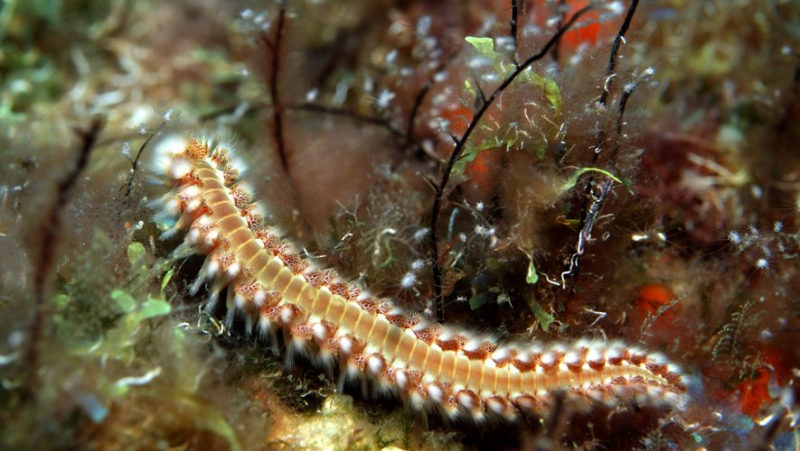Stinging venom, hard to kill and voracious… why the proliferation of fireworms in the Mediterranean is worrying ?

Le ver de feu possède une soie très urticante qui peut provoquer de vives brûlures. MAXPPP – GUILLEN AMAR ET ISABELLE
La présence de vers de feu en Méditerranée se multiplie. A cause du réchauffement climatique, leur prolifération est préoccupante, non seulement pour les baigneurs mais surtout pour la biodiversité.
The fish that Alfonso Barone hauls into his nets off the coast of Sicily are half devoured by fireworms, disturbing voracious predators that thrive in the increasingly warm waters of the Mediterranean.
These centipede-like creatures are fond of everything from coral to fish trapped in fishing nets, while rising water temperatures due to climate change encourage their multiplication. They usually measure between 15 and 30 cm, but can reach up to 50 cm.
Severe burning sensation
Alfonso Barone pulls a long, wriggling red worm from a headless mackerel aboard his boat. Its venomous white hairs break off at the slightest touch and dig into the skin, causing a sharp burning sensation. The 34-year-old says he has been stung many times, including once in the eye.
The worms pounce on the fish as soon as they are caught in the nets. Also called barbed worms, they “eat the head, the whole body, and gut it”, explains the fisherman as he hauls in a mutilated sea bream off the coast of the village of Marzamemi, a renowned tourist resort on the southeastern tip of Sicily.
Global warming
The presence of fireworms is not new in the Mediterranean, but they used to be much less numerous and were only seen in Sicily during the summer.
“With global warming, the waters are warming up, becoming an ideal habitat for these worms, which are more numerous every year, and are present throughout the year”, notes Alfonso Barone, who has been fishing since childhood.
Half-eaten fish cannot be sold. Fishermen have therefore reduced the duration of net immersion, which results in fewer catches and does not completely prevent attacks by brown, green or red worms.
“They used to eat about 30% of the catch… Now, this figure has risen to 70%”, he laments.
Predator and scavenger
The worms are also migrating to new areas: zoologist Francesco Tiralongo, who leads a project at the Sicilian University of Catania studying the phenomenon, has recorded cases in Calabria, the tip of the Italian Boot.
The fireworm “is an opportunistic species that behaves as both a predator and a scavenger”, and “there are impressive numbers of them… in very shallow water”, he notes in an interview with AFP.
On the beach of Marzamemi, somewhat worried holidaymakers put on masks or plastic shoes before swimming. "I refuse to let it ruin my vacation, but I always swim with my mask on to see the bottom", confides Fabiana Davanzo, a 56-year-old tourist from Milan (north).
As he cautiously dips his feet in the water, Salvatore Lazzaro, 51, explains that he was bitten by an unidentified creature the day before, but is braving the water again under a scorching sun.
The apprehension of swimmers and the loss of income for fishermen are not the only problems.
“Global warming is causing various changes in the Mediterranean, which will likely be exacerbated in the years to come,” warns Federico Betti, an expert on invasive species at the University of Genoa (northeast).
The average temperature of the Mediterranean has increased by about 1.2 degrees in the last 40 years, he recalls.
“Profound changes”
The warming of the seas is notably reflected in a reduction in seasonal variations of the species present and in less diverse environments incapable of sheltering rich ecosystems.
Heat can also cause episodes of mass mortality within a species, underlines Federico Betti.
On the other hand, other species benefit from it: we are seeing an increase in non-native tropical species in the Mediterranean, which “are causing profound changes in marine ecosystems", worries Francesco Tiralongo. These include the blue crab, which is devastating shellfish farms in the Po Delta in northern Italy. These crabs have no natural predators, but the Italians are trying to turn them into a resource by eating them.
Spaghetti with fireworms is unfortunately not an option.
You can't kill the worm by cutting it
Although more research is needed into possible solutions, Mr. Tiralongo has already made a disconcerting discovery: “You can't kill a fireworm by cutting it in half, because it has excellent regeneration".
"If you cut it in half, not only does the part with the head regenerate a back part, but the back part itself manages to grow a head in about 22 days".




